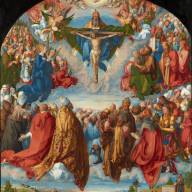“Listen, Israel: The Lord our God is the one Lord. You shall love the Lord your God with all your heart, with all your soul, with all your strength. Let these words I urge on you today be written on your heart.” The Scriptures also enjoin the people to bind these words to the arms and foreheads, and to their doorposts as a reminder. Most Jews will take this literally and have the words on a small piece of parchment in a container on their doorpost - known as a mezuzah. Orthodox Jews will also wear them on their wrists and foreheads at times of prayer contained in leather boxes called phylacteries. It is the greatest commandment, and sums up the first three commandments in the Decalogue. However, Our Lord reminds the scribes that this love for God must also be expressed in the way we treat our neighbour, as is spelt out in the remaining seven commandments. In doing God’s will we do something more pleasing to him than something we simply choose to do, such as making a voluntary offering or sacrifice. We can be tempted to offer God what we want to do as a substitute for doing what he asks of us. This is why the duties of love that flow from our state of life ought to have priority over something good but which we choose. For example meeting the basic needs of our family ought to take priority over giving time or money to our friends or to a good cause even though it is deserving of support.


















